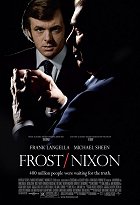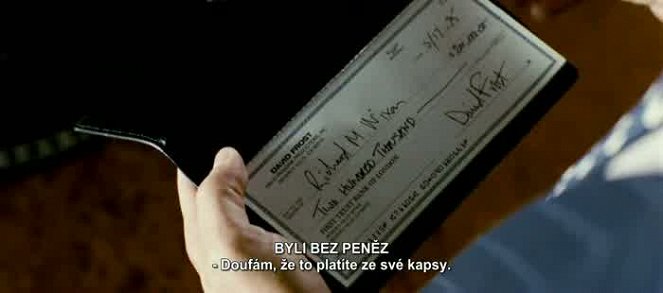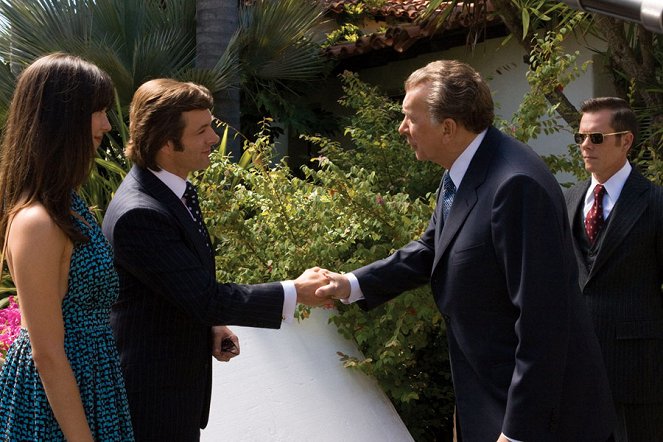Directed by:
Ron HowardCinematography:
Salvatore TotinoComposer:
Hans ZimmerCast:
Frank Langella, Michael Sheen, Sam Rockwell, Kevin Bacon, Matthew Macfadyen, Oliver Platt, Rebecca Hall, Toby Jones, Andy Milder, Kate Jennings Grant (more)VOD (2)
Plots(1)
When disgraced President Richard Nixon agreed to an interview with jet-setting television personality, David Frost, he thought he'd found the key to saving his tarnished legacy. But, with a name to make and a reputation to overcome, Frost became one of Nixon's most formidable adversaries and engaged the leader in a charged battle of wits that changed the face of politics forever. (official distributor synopsis)
(more)Videos (3)
Reviews (13)
A boxing match between a political champion and a loser from an entertainment slum, 4 rounds at a dazzling pace and nerve-wracking gradation. Ron Howard undoubtedly trimmed the political issue, adjusted both characters and put them into the ever popular scheme "David vs. Goliath KO in the last round"... However, I am honestly searching in vain, trying to find out when I enjoyed it more and when, behind the brilliantly elaborated scheme, I found such an exciting background and point that goes beyond mere entertainment. The Frost/Nixon duel reveals the part of politics one has to follow breathlessly, media fireworks, a powerful story and a remarkable message about the power of the television screen. I don't think this film will surpass the other Oscar favorite, in my opinion.
()
With this Oscar contender I have the same problem as with all other films by Howard, technically it’s flawless, but the emotional effect on me is zero. Those two hours went by nicely, the Frost-Nixon interview was great, but I don’t feel like watching this film ever again. If I had to compare it with this year’s other big political drama (Milk), Frost/Nixon would win by a long shot because I felt that this one at least knows what it Is about, while Milk felt very empty.
()
It's almost unbelievable, but Howard surprised and made a solid film. I wouldn't say that such a “ordinary”, purely conversational approach could captivate more than any of Howard's action scenes from previous works. Without sentiment, without fluff, only the most efficient and relatively gentle reconstruction of the well-known conversation between fantastically a played Nixon and an excellent Frost. The performances were phenomenal and that's what it was primarily about.
()
Just the idea of making this like a boxing match with a “former world champion vs. a talent who remained in the limelight" is excellent. On the one hand it is a fight for atonement/forgiveness and on the other for an admission/apology. Sheen acts so well and he doesn’t let the phenomenal Langella steal the movie. But still, it has its faults. It is still just a regular Howard movie. In other words, a simplified fairytale, this time political. But the list of factual sins is just too long (and not just what the IMDb reviewers mentioned). Primarily Nixon’s tirade during his nighttime phone call, this scene is like comic book movies where the most villainous ever villain reveals his complete plan (including the weaker bits) for conquering the world. I understand that from a movie point of view this is essential and needed, but then the result is unavoidably fiction which has nothing to do with reality. I personally think that to leave out that phone call and stay with the real state of affairs would have been better. It would at least leave room for viewer imagination about whether Frost really got Nixon down on the floor on his own or whether this wasn’t just another brilliant move by Nixon, letting him leave the scene maintain a little self-respect and, in a way, fame.
()
It's not often that a Hollywood studio reaches for socially significant material and allows for the creation of a film that deviates from the established templates of comic book adaptations, romantic and family comedies, or other entertainment genres. Frost/Nixon is an exceptionally successful film from a technical standpoint, with careful casting, a quality screenplay, and thoughtful direction. If there is a challenge somewhere, it lies in the subject matter itself, in what the creators see as crucial, and what they want to communicate. In reality, Frost/Nixon is not a film about politics and a controversial but influential figure of the time. It is about the role of the media, specifically television, which took on a decisive influence in shaping public opinion in the second half of the 20th century. It is no coincidence that the film repeatedly mentions the famous television debate between Kennedy and Nixon, where Nixon's defeat was decided by the sweat on his face, which appeared unpleasing on camera and made Nixon look older. The decisive moments of Nixon's scandal took place out of the television cameras' view. The ant-like work of investigators, investigative journalists, and behind-the-scenes negotiations of lobbyists during the impeachment process was all beyond the scope of this film as if it didn't exist. By the time the film's story takes place, Nixon was already out of the game, and the duel with Frost was merely a symbolic end to his tenure in office. The televised duel at the political level did not signify a significant turning point, and Nixon continued to publicly function as a private individual and a veteran of the Republican Party, which even considered resurrecting Nixon and his re-candidacy after Ronald Reagan's second term. Frost was and remained just an entertainer who made a mark in media history by managing to bring these events back to television screens and turn them into a major hit several months after the government scandal and the president's resignation. Frost approached the interview as an opportunity to gain visibility and make money. He didn't understand politics, but he knew and understood television as a medium very well. Overall impression: 80%.
()



Ads